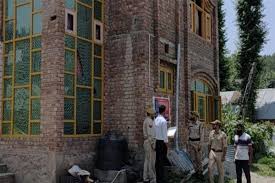In a powerful display of resilience and unity, Jammu & Kashmir Chief Minister Omar Abdullah chaired a special cabinet meeting in Pahalgam on Tuesday, sending a clear message that the government and people of the region refuse to be cowed by acts of terror. This unprecedented move—holding the cabinet meeting in Pahalgam, the very site of the devastating April 22 terror attack that claimed 26 lives, mostly tourists—was designed to underscore the administration’s commitment to peace, normalcy and the revival of tourism in the Valley.
The meeting marked the first time since the Omar Abdullah-led government took office in October 2024 that the cabinet convened outside the traditional power centers of Srinagar and Jammu. The symbolism was clear: despite the recent tragedy and its impact on the tourism sector, the government stands firm and unafraid. “It was not just a routine administrative exercise, but a clear message—we are not intimidated by cowardly acts of terror. The enemies of peace will never dictate our resolve. Jammu & Kashmir stands firm, strong, and unafraid,” the Chief Minister’s office declared in a statement on X.
The April 22 attack at Baisaran meadow in Pahalgam had sent shockwaves through the region, leading to an exodus of tourists and casting a shadow over the Valley’s vital tourism industry. Recognizing the importance of tourism as a lifeline for thousands of families, the cabinet meeting focused on strategies for the sector’s revival, including arrangements for the upcoming Amarnath Yatra and measures to reassure visitors of their safety. Omar Abdullah, in his remarks, emphasized that tourism must be treated as a “Conflict-Neutral” activity and called for a dual approach to resuscitate the sector—urging the central government to mandate public sector undertakings and parliamentary committees to hold meetings in Kashmir.
Beyond administrative discussions, the meeting was a gesture of solidarity with the people of Pahalgam and the broader Kashmiri community. The Chief Minister met with locals, including delegations led by MLA Altaf Kaloo, to listen to their concerns and aspirations. He praised the courage and unity shown by residents in the aftermath of the attack, highlighting their refusal to succumb to fear and their exemplary support for tourists and the administration during the crisis. “This meeting is our way of thanking them—for their resilience, for raising their voice against terrorism, and for not giving in to fear,” Abdullah stated.
The decision to hold the cabinet meeting in Pahalgam was widely recognized as more than a symbolic act; it was a reaffirmation of the government’s determination to not let violence derail its agenda for development, prosperity, and representation. Omar Abdullah’s leadership, both now and during his previous tenure, has been characterized by outreach to remote and affected areas, reinforcing the message that the administration stands with every community in times of adversity.
As the Valley looks to recover from the recent tragedy, the government’s actions in Pahalgam have offered hope and reassurance to locals and tourists alike. The message from Pahalgam is unequivocal: Jammu & Kashmir will not be intimidated, and the spirit of its people remains unbroken. The government’s commitment to peace, development and the revival of tourism stands as a testament to the enduring resilience of the region and its determination to chart a brighter, safer future.







